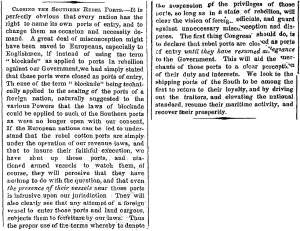Record Data
Transcription
CLOSING THE SOUTHERN PORTS. – It is perfectly obvious that every nation has the right to name its own ports of entry, and to change them as occasion and necessity demand. A great deal of misconception might have been saved to Europeans, especially to Englishmen, if instead of using the term “blockade” as applied to ports in rebellion against our Government, we had simply stated that those ports were closed as ports of entry. The use of the term “blockade” being technically applied to the sealing of the ports of a foreign nation, naturally suggested to the various Powers that the laws of blockade could be applied to such of the Southern ports as were no longer open with our consent. If the European nations can be led to understand that the rebel cotton ports are simply under the operation of our revenue laws, and that to insure their faithful execution, we have shut up those ports, and stationed armed vessels to watch them, of course, they will perceive that they have nothing to do with the question, and that even the presence of their vessels near those ports is intrusive upon our jurisdiction. They will also clearly see that any attempt of a foreign vessel to enter those ports and land cargoes, subjects them to forfeiture by our laws. Thus the proper use of the terms whereby to denote the suspension of the privileges of those ports, so long as in a state of rebellion, will clear the vision of foreign officials, and guard against the unnecessary misconception and disputes. The first thing Congress should do, is to declare that rebel ports are closed as ports of entry until they have resumed allegiance to the Government. This will aid the merchants of those ports to a clear perception of their duty and interests. We look to the shipping ports of the South to be among the first to return to their loyalty, and by driving out the traitors, and elevating the national standard, resume their maritime activity, and recover their prosperity.


